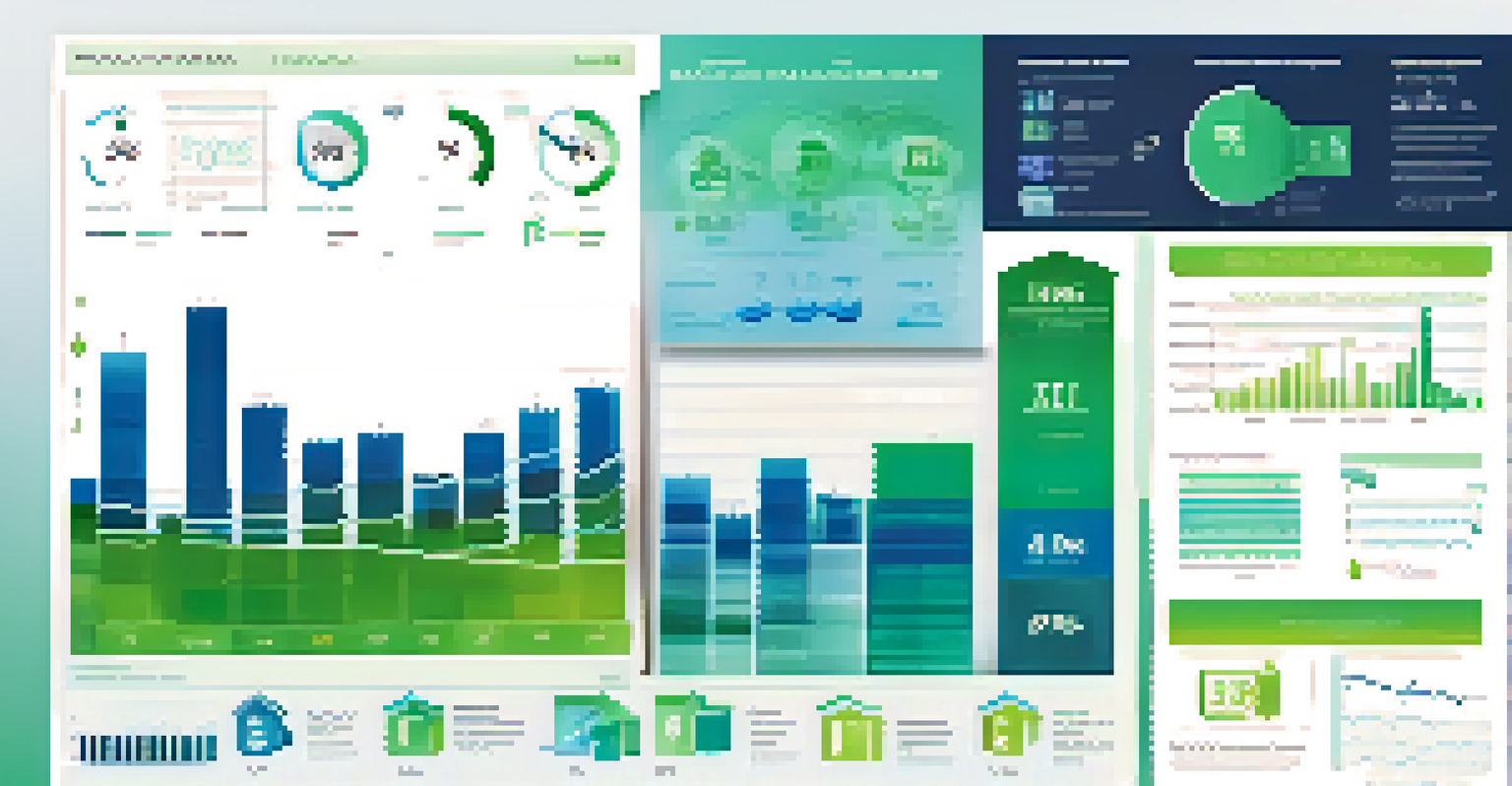Using Data Analytics to Drive Real Estate Marketing Success

Understanding the Role of Data Analytics in Real Estate
Data analytics has become a game changer in the real estate industry, providing insights that were previously hard to come by. By leveraging data, real estate professionals can identify trends, understand customer preferences, and make informed decisions that drive marketing success. It’s almost like having a crystal ball that reveals what potential buyers are looking for.
In the age of information, data is the new oil.
For instance, analyzing market data can help agents determine the best time to list a property, ensuring maximum visibility and potential offers. Similarly, understanding demographics can guide targeted marketing efforts, so you’re not just shouting into the void but rather communicating directly with interested buyers. This level of insight transforms what used to be guesswork into strategic planning.
Ultimately, integrating data analytics into your real estate marketing strategy means you can allocate resources more effectively and see a higher return on investment. Whether you’re a seasoned agent or a newcomer, embracing these tools is essential for staying competitive in today’s market.
Collecting the Right Data for Effective Marketing
The first step in using data analytics effectively is knowing what data to collect. This can include demographic information, property sales history, website traffic, and social media engagement metrics. Think of it like gathering ingredients before you start cooking; the right data will help you craft a marketing strategy that is both appealing and effective.

For example, if you notice that a particular neighborhood is attracting young families, you might focus your marketing efforts in that area. By tracking which properties are selling quickly and which are languishing, you can adjust your strategies accordingly. This proactive approach not only helps in crafting targeted messages but also ensures you are meeting the needs of your audience.
Data Analytics Transforms Real Estate
Leveraging data analytics allows real estate professionals to make informed decisions, identify trends, and enhance marketing strategies.
Additionally, remember that data collection is not a one-and-done task. Regularly updating your data and analyzing new trends is crucial for staying relevant. The real estate market is dynamic, and keeping your finger on the pulse of this data will ensure your marketing efforts remain effective.
Leveraging Data Analytics Tools for Real Estate Marketing
Today, there are a plethora of data analytics tools designed specifically for real estate professionals. These tools can help you visualize complex data, track performance metrics, and even automate marketing campaigns. Using these technologies can feel like having a personal assistant who manages all the nitty-gritty details, so you can focus on what you do best—selling properties.
Without data, you're just another person with an opinion.
Popular tools like Google Analytics, Tableau, and various CRM platforms allow you to extract meaningful insights from raw data. For instance, Google Analytics can show you how visitors interact with your website, revealing which listings attract the most interest. By understanding this behavior, you can tailor your marketing strategies to highlight the properties that resonate most with potential buyers.
Moreover, many of these tools offer user-friendly interfaces, making it easier for even those who aren’t tech-savvy to navigate. The key takeaway here is that leveraging the right tools can enhance your marketing efforts and ultimately lead to increased sales.
Using Predictive Analytics to Anticipate Market Trends
Predictive analytics is a powerful aspect of data analytics that allows real estate professionals to foresee market trends and buyer behaviors. By analyzing historical data and identifying patterns, you can make predictions about future events. It’s like having a map that shows not just where you are, but where you’re headed.
For instance, if data indicates a rise in remote working trends, you might anticipate increased demand for homes with office spaces. This foresight allows you to adjust your marketing strategies to focus on these types of listings before they become hot commodities. By positioning yourself as a forward-thinking agent, you’re not just reacting to the market; you’re shaping it.
Targeted Campaigns Boost Engagement
Creating targeted marketing campaigns based on data insights helps real estate agents connect with their audience more effectively.
Ultimately, the ability to anticipate market trends can give you a competitive edge, allowing you to be proactive rather than reactive. In a fast-paced industry like real estate, this advantage can translate into significant financial success.
Creating Targeted Marketing Campaigns with Data Insights
Once you have the right data, the next step is creating targeted marketing campaigns that speak directly to your audience’s interests. By segmenting your audience based on demographics, preferences, and behaviors, you can tailor your messaging to resonate more deeply. Imagine sending out a personalized invitation to a party instead of a generic flyer—it’s much more likely to get a positive response.
For example, if data reveals that first-time homebuyers are interested in affordable properties in family-friendly neighborhoods, your marketing efforts can focus on showcasing those listings. Using targeted ads on social media platforms can also help you reach these specific groups, ensuring that your message lands in front of the right eyes.
This precision not only enhances engagement rates but also builds trust with your audience. When potential clients see that you understand their needs, they are more likely to turn to you when they’re ready to make a move in the real estate market.
Measuring Success: Key Metrics for Real Estate Marketing
Measuring the success of your marketing efforts is essential for understanding what works and what doesn’t. Key performance indicators (KPIs) such as lead conversion rates, website traffic, and engagement metrics can provide valuable insights into your campaigns. It’s like checking your GPS to ensure you’re on the right path; without measuring success, you might find yourself lost.
For instance, if you notice a high volume of traffic to your listings but low inquiries, it may indicate that your property descriptions or photos need improvement. Conversely, a high conversion rate suggests that your marketing messages are hitting the mark. By regularly analyzing these metrics, you can refine your strategies to maximize effectiveness.
Adapt Strategies with Market Insights
Continually adapting marketing strategies based on data-driven insights ensures relevance and competitiveness in the evolving real estate market.
Don't forget to celebrate your successes, too! Acknowledging what works well can motivate your team and inspire even more creative marketing solutions.
Adapting Strategies Based on Data-Driven Insights
The real estate market is constantly evolving, and being able to adapt your marketing strategies based on data-driven insights is key to long-term success. Flexibility is vital; what worked last year may not have the same impact today. Think of your marketing strategy as a living organism that needs to evolve to survive and thrive in a changing environment.
For example, if data shows that video content is gaining traction among your target audience, consider incorporating virtual tours or video listings into your marketing plan. This adaptability not only keeps your marketing fresh but also aligns you with current trends, making you more appealing to potential clients.

Ultimately, being open to change and willing to pivot based on insights can set you apart in a competitive market. Remember, data analytics isn’t just a tool; it’s a mindset that fosters growth and innovation in your real estate marketing efforts.